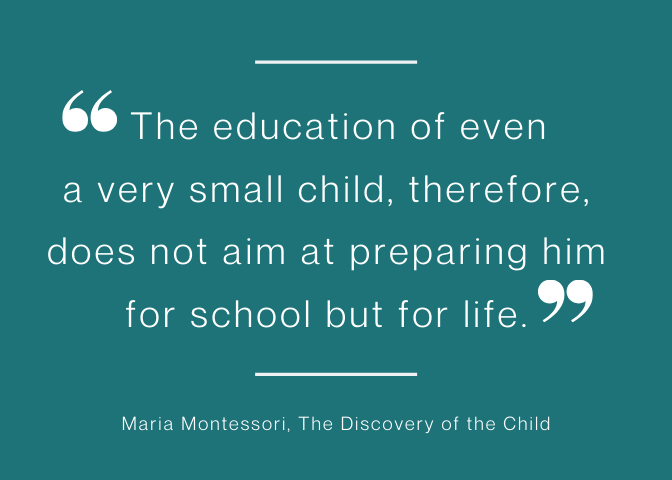Why Montessori?
Montessori schools, when fully implemented, promote hands-on, self-paced, collaborative learning with authentic problem solving that responds to the needs of their physical environment or of their community. Students in Montessori are encouraged to follow their interests, engage in deep intellectual inquiry, and expand self-assessment toward self- perfection within or beyond the national academic standards. The student develops a strong sense of self and has agency of their own voice. Students earn expanding freedom of choice with increasing responsibility in an intentionally sized community of diverse learners and international cultures. Montessori promotes leadership, empathy, responsibility, self-discipline, independence, adaptability, resilience and a curiosity for lifelong learning.
Children and adolescents have an innate interest in the world around them. It is through their natural curiosity that they develop themselves. Montessori education provides a carefully prepared environment that supports the natural process of child development. Through the Montessori approach, children develop fundamental capacities that are needed to become happy, fulfilled adults who contribute to society in a thoughtful, successful way.
What does a Montessori environment provide?
- Scientifically Prepared Learning Environments intentionally designed to respond to the needs of students at each stage of their natural development.
- Hands-on learning through a wide range of activities to spark and expand children’s interest.
- Peer-to-peer learning that fosters social interaction, inclusion, and mastery through project collaboration and teamwork.
- Independence by allowing children the freedom to work at their own individualized pace, without interruption, choosing from a range of activities that are developmentally challenging and appropriate.
- Encouragement to explore and discover things for him/herself. Children are given the freedom to make mistakes and correct them independently.
- Respect for each child as an individual personality with unique talents, respect for others, respect for community, and respect for the environment.
Montessori teachers have a deep understanding of child development and have been intentionally trained to guide children toward productive and challenging experiences, both individually and collectively, which provides a firm foundation for their future.
Many well-known people have been educated in Montessori schools, including:
-
- Jeff Bezos, founder of Amazon.com
- Sergey Brin and Larry Page, co-founders of Google
- Jacqueline Bouvier Kennedy Onassis – former first lady (John F. Kennedy)
- Prince William and Prince Harry
- Will Wright – Video game pioneer, creator of the Sims
- Gabriel Garcia Marquez – Nobel Prize winner for Literature
- Katherine Graham – former owner of the Washington Post
- Anne Frank, author, diarist from World War II
- Helen Keller – Political activist, author, lecturer, awarded the Presidential Medal of Freedom
- Julia Child, first world-famous television chef, author
- Joshua Bell, American violinist
- Helen Hunt – Academy award-winning actor
- Elizabeth Berridge – actress
- George Clooney – Academy award-winning actor, director, producer, humanitarian, United Nations Messenger of Peace
- Melissa and Sarah Gilbert – actors
- Taylor Swift – Grammy Award-winning singer/songwriter
- Beyonce Knowles – Singer, songwriter, actress and fashion designer, 16-time Grammy award-winner
- Devi Sridhar – Youngest-ever American Rhodes scholar, author, Oxford research fellow and lecturer on global health politics
- T. Berry Brazelton – pediatrician and author
From What School Could Be.

